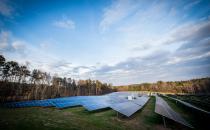NC considers climate change solution as communities feel impacts
SELC just filed a petition urging North Carolina to confront climate change by joining other states in a cooperative effort to reduce heat-trapping carbon dioxide emissions from power plants.
“With climate change already harming North Carolina, and science telling us we are running out of time to reduce our heat-trapping gas emissions, now is the time to take action,” says Gudrun Thompson, a senior attorney. “Whether we act now or delay determines our future as well as the legacy we leave our children and grandchildren.”
The petition for rulemaking, which Thompson says “outlines a cost-effective solution that is proven to work and ready to go to protect North Carolina’s economy, environment, and people,” was sent to the North Carolina Environmental Management Commission on behalf of Clean Air Carolina and the North Carolina Coastal Federation.
Under SELC’s proposal, the state would establish a carbon dioxide emissions-trading program and participate in the existing Regional Greenhouse Gas Initiative (RGGI) implemented by states from New England south through Virginia. In such a program, if a power plant emits carbon dioxide, it has to buy an allowance for each ton of carbon dioxide pollution it produces. Allowances can be bought and sold in a regional auction, which helps to keep costs down. The number of available allowances is reduced over time to reduce pollution.
We know action to reduce carbon dioxide emissions is urgently needed as North Carolinians increasingly feel the impacts of climate change from flooding, slower storms that drop more rain, rising sea levels that are harming coastal farmland, and warmer and more humid days and nights. Scientists warn of more dire consequences for North Carolina’s economy, environment and people—including to people’s health—if no action is taken or action is delayed.
“A hotter climate causes more extreme weather and higher seas that drown our coast in major floods that occur all too routinely,” says Todd Miller, executive director of the North Carolina Coastal Federation. “Recovery from these disasters cost taxpayers billons of dollars almost every year.”
Coastal Review Online, published by the North Carolina Coastal Federation, is sharing stories on how local families are still recovering from the impacts of Hurricane Florence, and raising awareness on the increase in hurricane power and frequency brought on by climate change. Click here to read their stories.
SELC’s petition outlines a comprehensive approach to limit and reduce heat-trapping carbon dioxide emissions from power plants by participating in a regional emissions-trading program, and the commission has 120 days to initiate rulemaking or deny it. For more detials on the program, click here.
States already participating in RGGI saw carbon dioxide emissions from the power sector drop 47 percent over the last decade, as well as fewer premature deaths, hospital visits, and lost work or school days associated with asthma and other respiratory illnesses, strokes, and heart attacks. A similar approach was successfully used a few decades ago when acid rain plagued the United States, harming and killing fish, wildlife, and forests. That issue is now largely in the past thanks to a cap-and-trade program for nitrogen oxides and sulfur dioxide, the primary causes of acid rain.
Participation in the regional program is a cost-effective and proven policy option to reduce carbon dioxide emissions consistent with Governor Cooper’s Executive Order No. 80 and the Department of Environmental Quality’s Clean Energy Plan, which sets a goal of reducing carbon dioxide emissions from the power sector by 70 percent by 2030, reaching net zero emissions by 2050.
“Climate change is a health disaster for North Carolina, and one that will only get worse the longer we wait to act,” says June Blotnick, executive director of Clean Air Carolina. “It’s time we use proven, cost-effective strategies and coordinate with other states to efficiently reduce climate emissions across the eastern U.S., protecting the health of our communities and the environment.”


